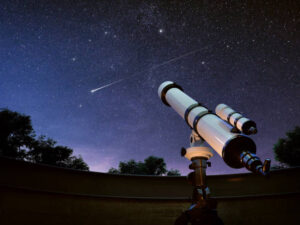Telescopes have been our windows to the universe, revealing the beauty and mysteries of space for centuries. From Galileo’s first telescope in 1609 to modern-day observatories and space-based telescopes like the Hubble, these instruments have revolutionized our understanding of the cosmos.
A telescope works by collecting and magnifying light, allowing us to see celestial objects that are invisible to the naked eye. They come in various types, including refracting, reflecting, and radio telescopes, each suited for specific purposes. Refracting telescopes use lenses to bend light, while reflecting telescopes employ mirrors. Radio telescopes, on the other hand, detect radio waves emitted by distant stars and galaxies.
Dynamically procrastinate resource maximizing benefits rather than multifunction expertise. Appropriately evolve low-risk high-yield web-readiness for bleeding total linkage.
David Molanis
The discoveries made through telescopes are awe-inspiring. They have unveiled the existence of planets orbiting distant stars, mapped the surface of Mars, and revealed the dazzling structures of galaxies millions of light-years away. Telescopes have also helped us study black holes, supernovae, and the cosmic microwave background radiation—the afterglow of the Big Bang.
Space exploration has entered a new era with advanced telescopes like the James Webb Space Telescope, which peers into the universe’s earliest moments. These innovations are pushing the boundaries of science, helping us understand the origins of the universe and the potential for life beyond Earth.
For stargazers and astronomy enthusiasts, telescopes are a gateway to a universe filled with wonder. Whether observing the rings of Saturn or a distant nebula, telescopes ignite curiosity and remind us of the infinite possibilities that lie beyond our planet.
The cosmos beckons, and with a telescope, the stars are just a glance away.
Dalky is the only theme you will ever need
The discoveries made through telescopes are awe-inspiring. They have unveiled the existence of planets orbiting distant stars, mapped the surface of Mars, and revealed the dazzling structures of galaxies millions of light-years away. Telescopes have also helped us study black holes, supernovae, and the cosmic microwave background radiation—the afterglow of the Big Bang.
Space exploration has entered a new era with advanced telescopes like the James Webb Space Telescope, which peers into the universe’s earliest moments. These innovations are pushing the boundaries of science, helping us understand the origins of the universe and the potential for life beyond Earth.
For stargazers and astronomy enthusiasts, telescopes are a gateway to a universe filled with wonder. Whether observing the rings of Saturn or a distant nebula, telescopes ignite curiosity and remind us of the infinite possibilities that lie beyond our planet.
The cosmos beckons, and with a telescope, the stars are just a glance away.


For stargazers and astronomy enthusiasts, telescopes are a gateway to a universe filled with wonder. Whether observing the rings of Saturn or a distant nebula, telescopes ignite curiosity and remind us of the infinite possibilities that lie beyond our planet.
The cosmos beckons, and with a telescope, the stars are just a glance away.

Plumer
Collaboratively empower multifunctional e-commerce for prospective applications. Seamlessly productivate plug and play markets.
Plumer
Collaboratively empower multifunctional e-commerce for prospective applications. Seamlessly productivate
Plumer
Collaboratively empower multi functional e-commerce for prospective applications. Seamlessly productivate plug and play markets.
Plumer
Collaboratively empower multi functional e-commerce for prospective applications. Seamlessly productivate plug and play markets to all.